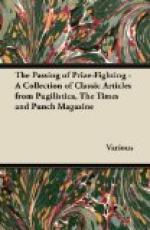There is a right of way through the park up to the house, which belongs to the Earl of C——, but is not of great architectural interest. Bear to the right in front of the house, along a path which skirts the wall of the private grounds. At the end of the wall a gateway leads into the high road, and a walk of under two miles will bring you to the, at one time, pretty village of K——, which has, however, grown rapidly into a thriving town. Before reaching the parish church there is a hostelry on the right-hand side of the road where an excellent tea may be obtained (so far as the food regulations will allow).
On leaving the inn, turn through a gateway at the side of it, which gives on to a straight and rather uninteresting road, which has been considerably built upon and is more or less private, though a right of way has been preserved through it. A glimpse of a large mansion, chiefly of the 17th century, and now in the possession of the W——s, may be obtained through the trees on the right of the road.
When you come to the main road (at the far end of this semi-private road) turn to the right, and just where the gibbet used to stand, so it is said, in the good old days, there is a sharp left-angled turn which leads to the village of E——. Keep straight on, however, for a mile or two (notice the fine old timbered houses on the right of the footpath opposite the old boundary-post), and then turn to the right by the church, rebuilt in the 17th century on the site of an older and finer one, whose spire was at one time a noted landmark.
A walk through the churchyard to the church porch brings you to the brow of a hill. Descend this to the cross-roads at the bottom, but, instead of turning to either hand, keep to the narrow road in front till you come to a gateway on the left. This leads to a house which formerly belonged to the Knights Templars, but which passed into the hands of the L——s and is still in their possession. There is an interesting chapel in the grounds, containing the tombs of some of the former owners, whose deeds were more warlike, though probably less numerous, than those of the present occupants.
From here an easy walk up the Strand will bring you to the starting point, Charing Cross Embankment Station, where you can take the train again; but if you are fit and between the ages of forty-one and fifty, you can continue the walk till you reach the nearest Recruiting Office.
* * * * *
“Happy Home offered slight Mental Youth or otherwise.”—Times.
A chance for one of our slim conscientious objectors.
* * * * *
LINES ON RE-READING “BLEAK HOUSE.”
There was a time when, posing as a purist,
I thought it fine to criticise
and crab
CHARLES DICKENS as a crude caricaturist,
Who laid his colours on too
thick and slab,
Who was a sort of sentimental tourist
And made life lurid when it
should be drab;
In short I branded as a brilliant dauber
The man who gave us Pecksniff and
Micawber.




